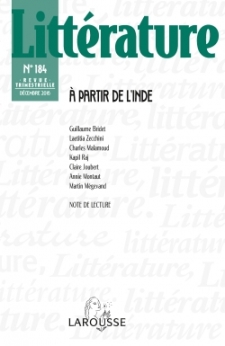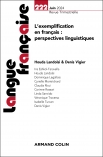
Littérature n° 184 (4/2016)
Pour acheter ce numéro, contactez-nous
Recevez les numéros de l'année en cours et accédez à l'intégralité des articles en ligne.
Simone Weil, incomparable penseur de la force, n’occupe pas encore la place qu’elle mérite au sein des études postcoloniales en France. On propose de réparer cet oubli en s’interrogeant sur le détour qu’elle effectue par les sagesses de l’Inde ancienne dès les premiers temps de l’Occupation. Posant l’hypothèse d’un lien entre cet intérêt pour les cultures de l’Inde ancienne et une forte sensibilité à la question de l’altérité coloniale, on rend compte de la dimension pratique de ce détour qui confirme ses décisions de passage à l’acte contre le nazisme et on examine l’inventivité philologique dont fait preuve cette helléniste si engagée dans les combats de son temps.
Simon Weil is an unparalleled thinker of the notion of strength, and yet she still has not taken her rightful place within the field of postcolonial studies in France. This article intends to compensate for this neglect by analysing and describing the ways in which she makes a detour to the ancient wisdoms of India right from the beginning of the Occupation in France. By claiming that there is a direct link between Simone Weil’s interest in the ancient cultures of India and her strong receptivity to the colonial question, this article examines both the practical dimension of this detour which will reinforce her decision to act against Nazism, and the philological inventiveness of this extraordinary Hellenist who was engaged in the struggles of her time.

